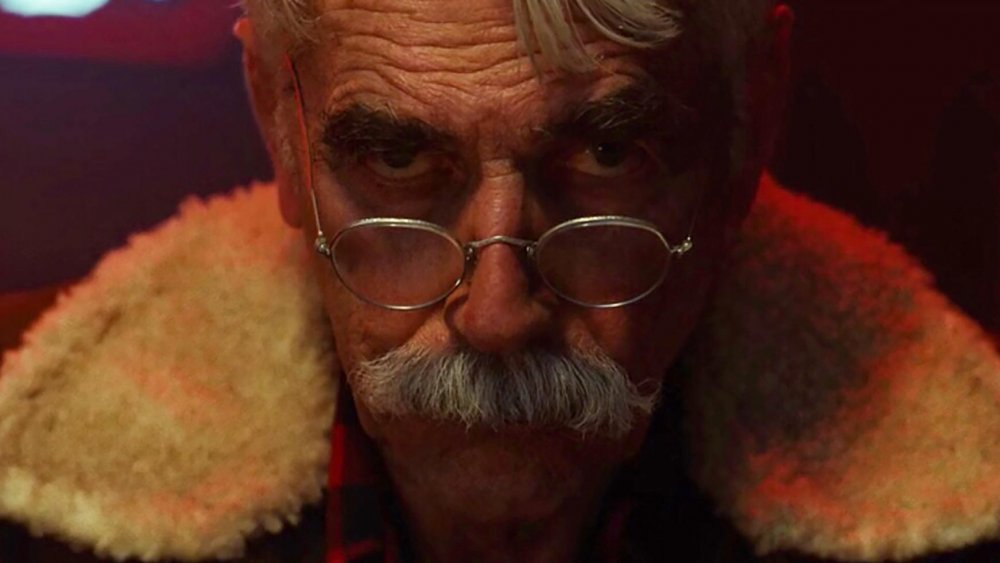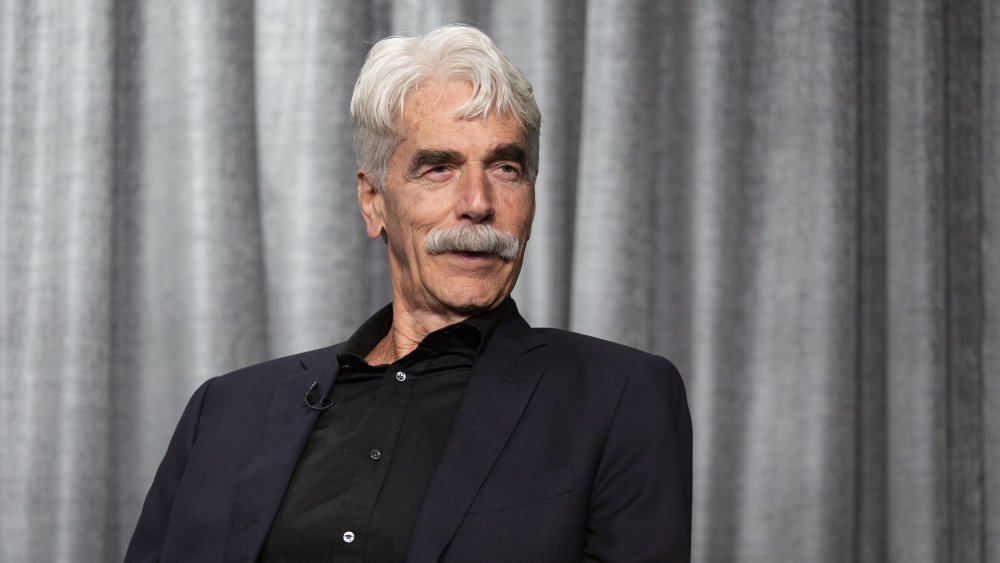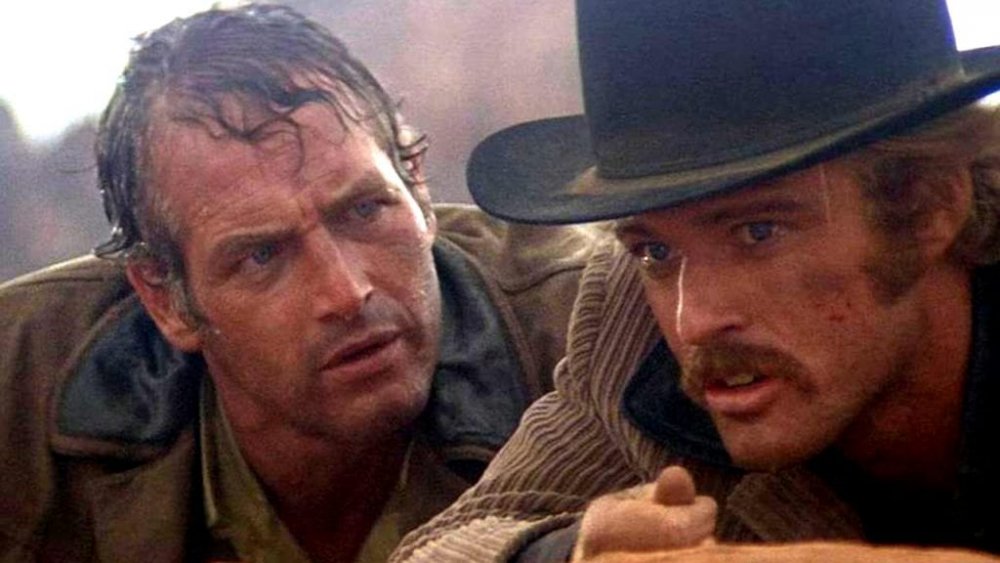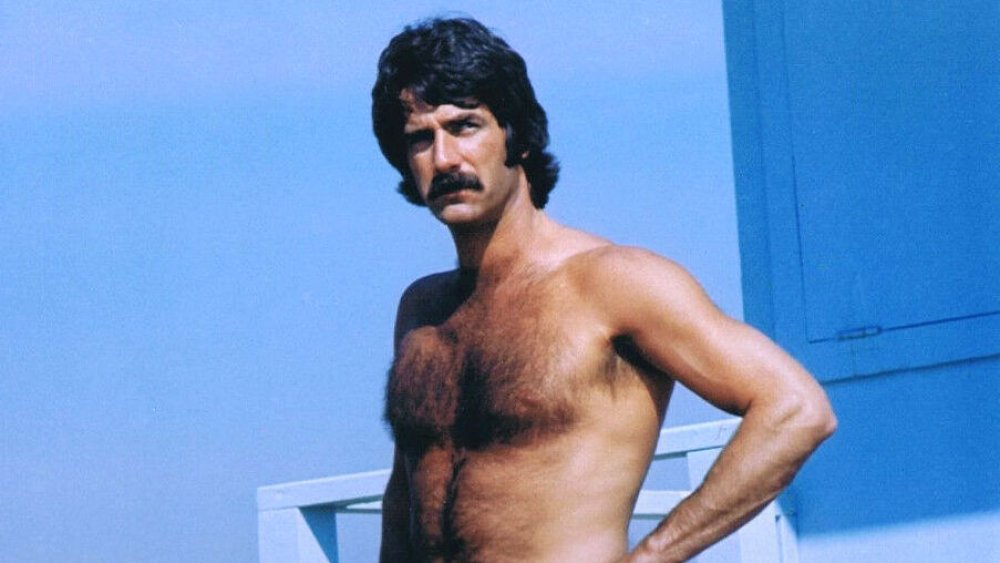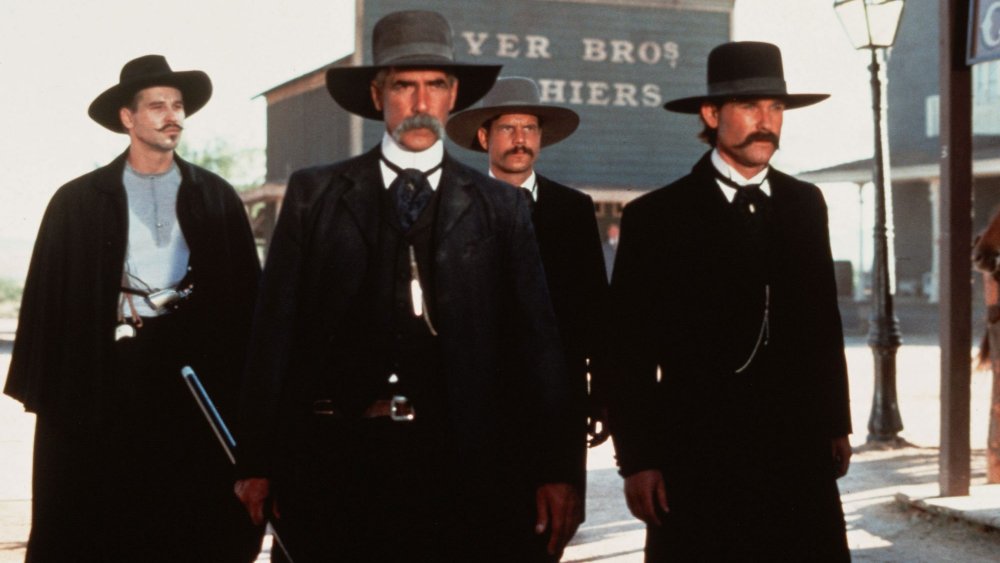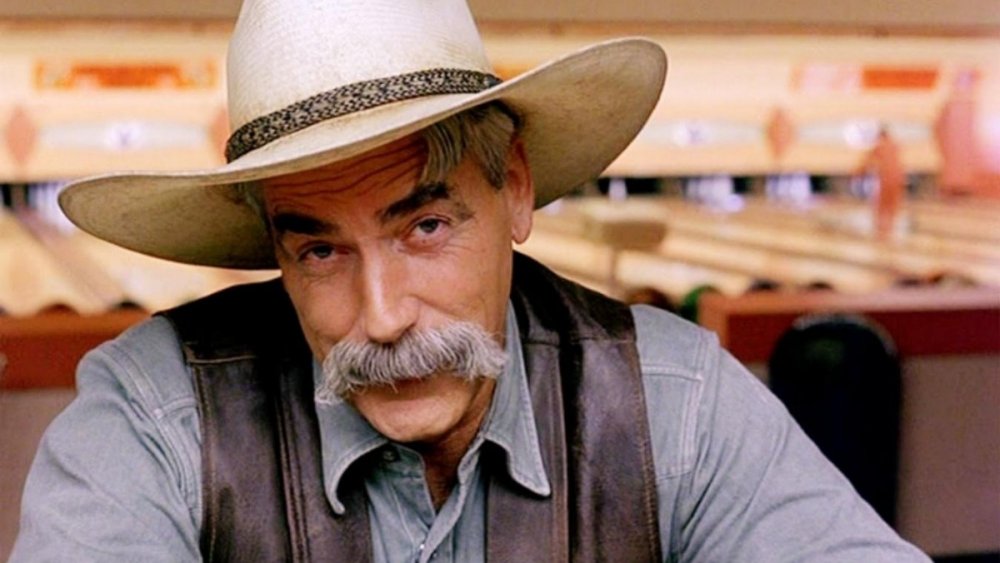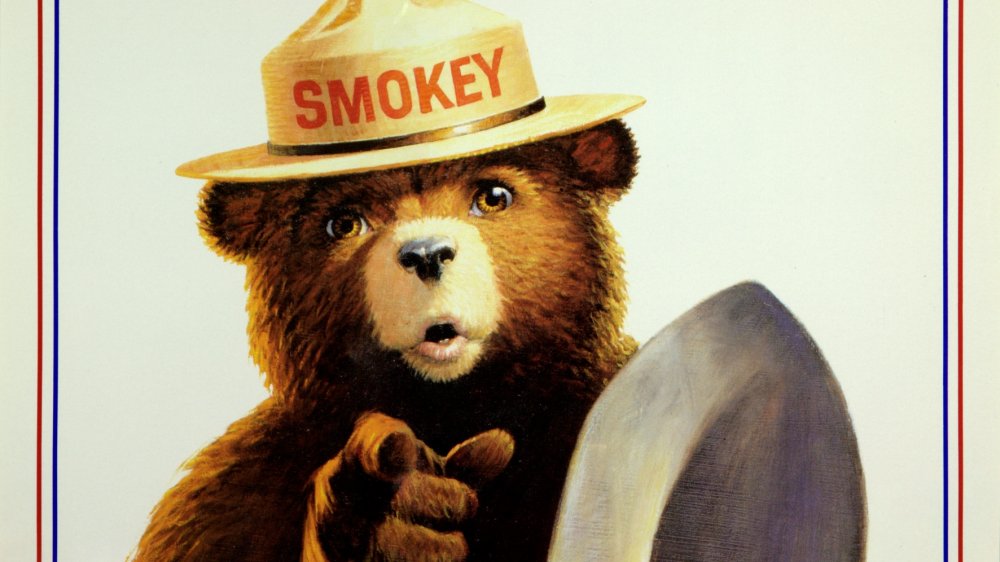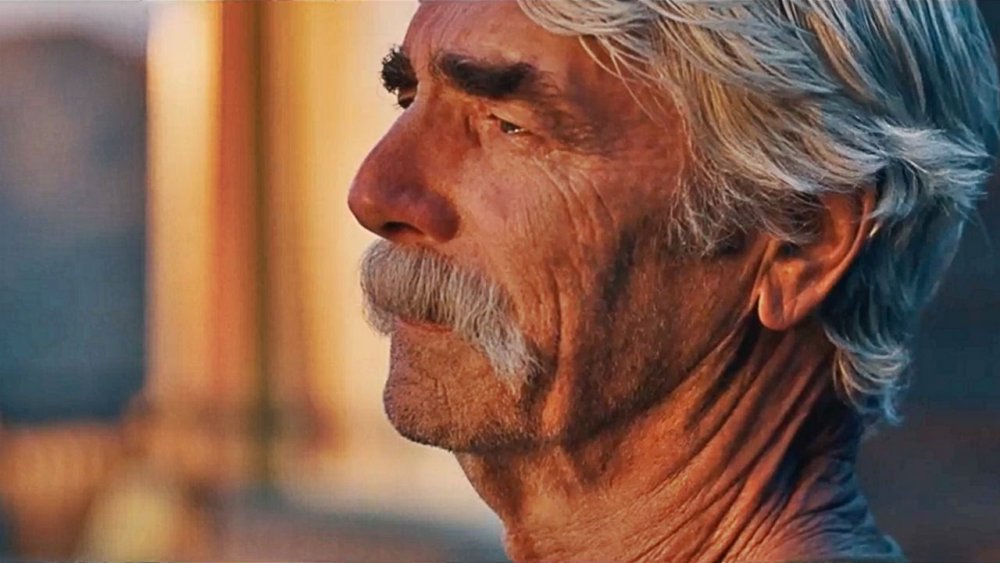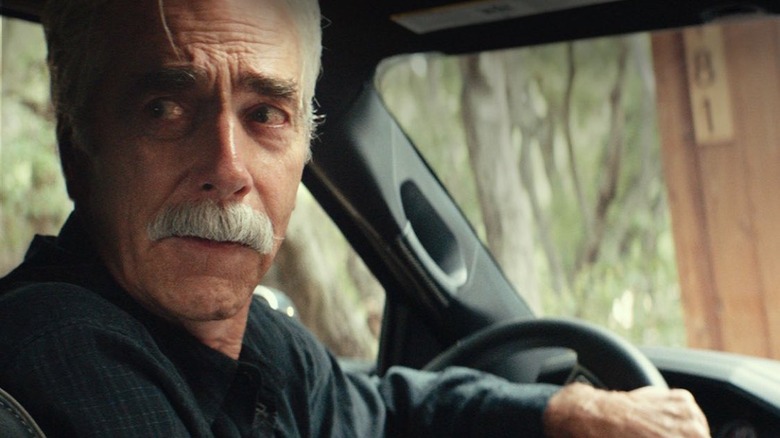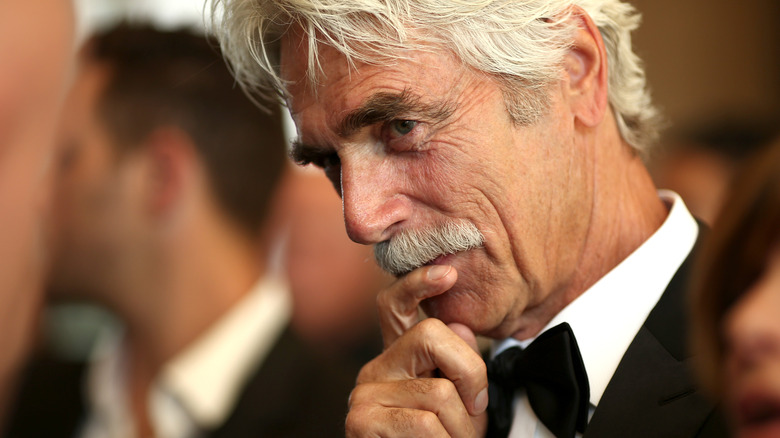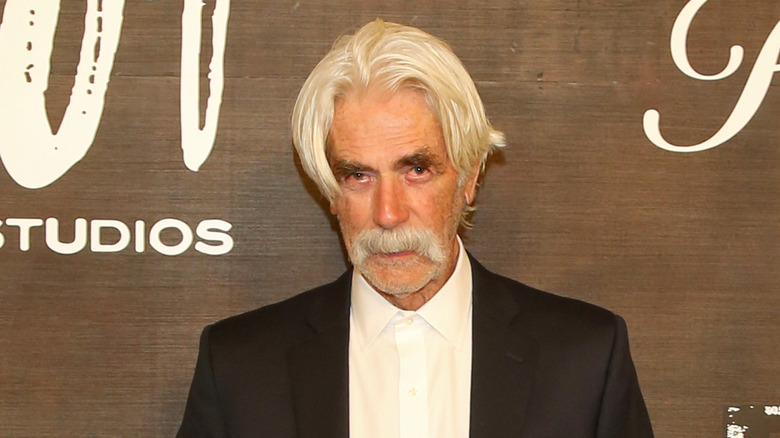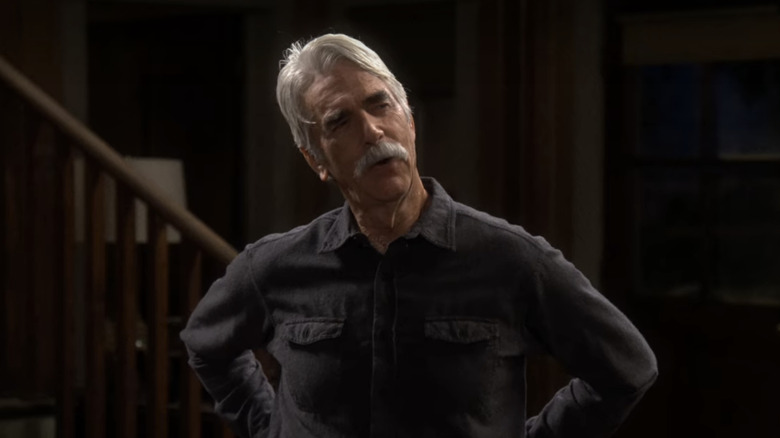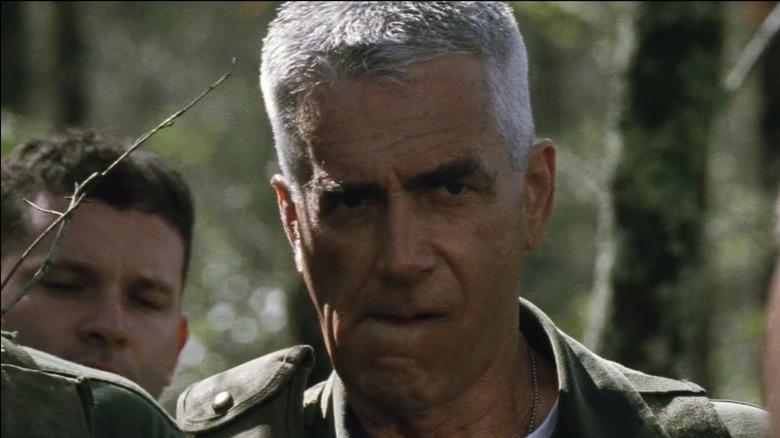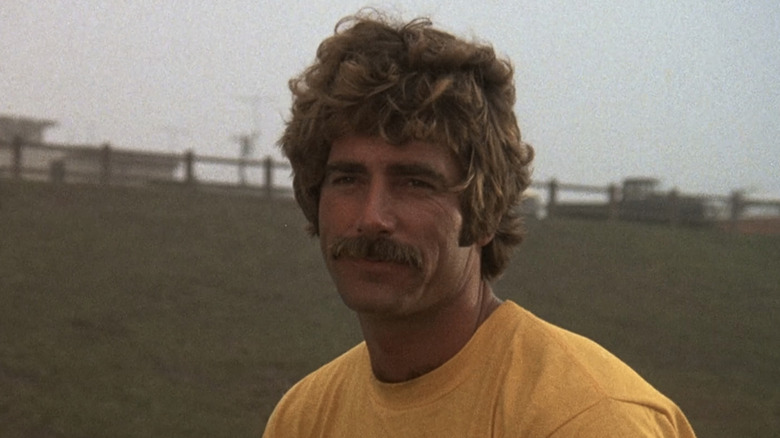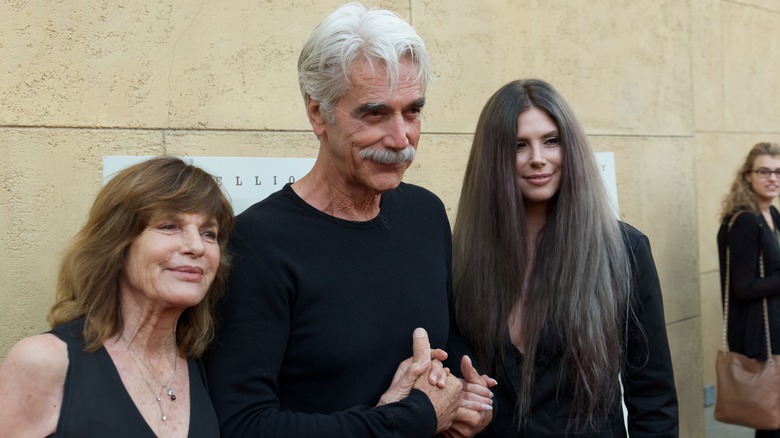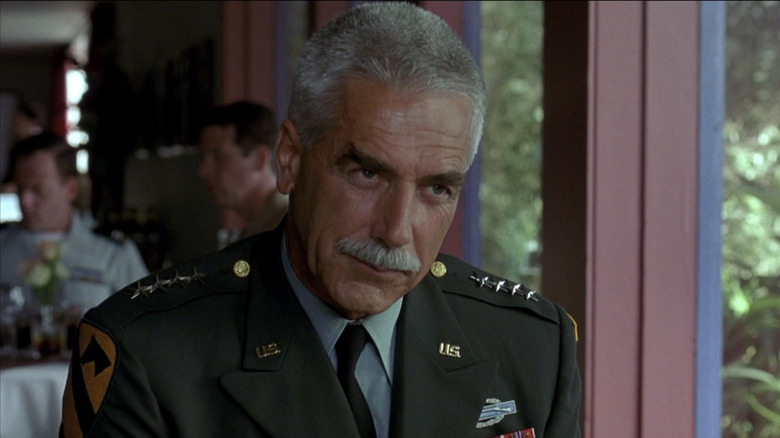The Untold Truth Of Sam Elliott
As far as epically mustachioed, gravelly voiced, all-around tough guys go, there aren't too many actors in Hollywood who can stack up against "1883" star Sam Elliott.
These days, Elliott is among the most recognizable faces in the business — not least because of his role in the aforementioned Paramount+ hit — but the funny thing about him is that even though he's spent more than 50 years as a professional actor, and even with his distinctive drawl and upper-lip adornment, it wasn't until relatively recently that he began receiving a level of widespread recognition befitting his talents. In fact, while over the decades he's appeared in many movies that you've probably seen numerous times — a few of which are likely among your favorites — it wouldn't be surprising if you didn't know his name until the last handful of years.
While he's spent half a century working in the fringes of the film biz, he's had plenty of opportunity to accumulate a mysterious backstory about which we're all mostly ignorant. But now that he's stepped into the spotlight at long last, it's time to take a look at the untold truth of Sam Elliott.
Sam Elliott's father didn't want him to act
Born in 1944 in Sacramento, California, Sam Elliott (who has the unique middle name "Pack" — there's a fun bonus fact for you) moved to Portland, Oregon when he was still a kid, finding himself in a state where he and his father had plenty of access to nature. His father worked for the U.S. Fish and Wildlife Service as a predatory and rodent control specialist, and the two spent a lot of time in the great outdoors.
Young Elliott eventually enrolled at the University of Oregon where he studied English and psychology for just two terms before dropping out of college to pursue his passion for acting — a calling that made his father less than excited. The two sparred over the career choice and were sadly never able to settle their differences, as his father died of a heart attack when Elliott was just 18. Many years later while speaking in an interview with The Star, he explained, "He died thinking, 'Man, this kid is going to go down the wrong path.' And I think on some levels that was either hard on me or made me more focused in my resolve to have a career, you know what I mean?"
Luckily for Sam Elliott and his fans, he decided to follow his dream. Unfortunately, his father never got to see him achieve the success that the elder Elliott probably foresaw would be hard coming — if it ever came at all.
Sam Elliott's bit part in a big movie
When the wheels began rolling on Sam Elliott's acting career, he did what a lot of actors before him had done: Started out in small roles in television Westerns, eventually earning slightly more substantial parts in the hit shows Lancer and Mission: Impossible.
His first role in a major film came in 1969's Butch Cassidy and the Sundance Kid, which featured the superstar leads Paul Newman and Robert Redford in the titular roles. A comedic Western based on the lives of two notorious bank-robbing outlaws, the film seems like a perfect fit for Elliott, who spent much of his career working within the genre. Unfortunately for him, he had a blink-and-you'll-miss-it part as a card player. He didn't even have any lines.
While the role didn't have much of an impact on his career, the movie did have a rather coincidental place in his life. Starring beside Newman and Redford was Katharine Ross, and though she and Elliott shared no scenes and didn't cross paths during filming, nearly ten years later, they did meet again and start dating as co-leads in The Legacy. It wasn't long before the couple were married. Today, they're still together, and they have a daughter.
His growing success and problems in the '70s and '80s
Over the course of the 1970s and 1980s, Sam Elliott never quite hit it big, but he did enjoy increasing recognition as a character actor appearing in television shows, TV movies, and big screen productions.
His first major starring role in a feature film came in 1976's Lifeguard, which tells the tale of a lifeguard working in Southern California who's forced into self-reflection after attending a high school reunion and realizing that his classmates have accomplished greater things with their lives. While the movie performed decently in the box office, it was lampooned by critics, and Elliott himself was unhappy with its lowbrow marketing. He complained bitterly during the promotional tour, which caused the studio heads at Paramount to become displeased. As a result, he never worked with the company again.
That wasn't the only trouble he experienced during this period. During an interview in 1980, Elliott revealed that he'd been propositioned repeatedly during auditions, saying, "You cannot believe the casting couch stories I could tell you, man. The clichés are all true. I've had propositions from men and women, and I've turned them all down. It's probably hurt me, but I'm the one who has to live with that guilt. My conscience is clear, even though my career is still not setting the world on fire."
Perhaps unsurprisingly, he later became a vocal supporter of the #MeToo movement, telling Variety, "Women in this town have been put upon by the men in this business the way they have for so long." However, these decades weren't all hard times, as he scored a number of high-profile roles that were instrumental in boosting his visibility. In 1985, he starred in a supporting role alongside Cher in Mask, then in 1989, he starred next to Patrick Swayze in the cult classic Road House.
He really got things rolling in the '90s
By the time the 1990s rolled around, Sam Elliott had spent more than 20 years in Hollywood, but he still didn't have much in the way of name recognition. For the most part, he seemed destined to forever be a somewhat acknowledged face without a name. With the arrival of his third decade in the business, however, that was about to change.
After playing a substantial part in the critically acclaimed civil war epic Gettysburg, Elliott starred alongside Kurt Russell in the now-classic Western Tombstone, which was hailed by audiences and critics alike. In the role of Virgil Earp — from the famous real-life Old West family of lawmen headed by the renowned Wyatt Earp — Elliott's many years of acting in the genre fit him into the role like a foot in a cowboy boot. This helped to propel him into prominent parts in future films like When We Were Soldiers, Thank You For Smoking, and of course The Big Lebowski.
Sam Elliott was written into The Big Lebowski before he even knew it
While today The Big Lebowski is known as something of a cultural touchstone, responsible for inspiring bathrobe-wearing dudes and white Russian cocktail parties everywhere, it's easy to forget that when it was initially released back in 1998, it was nothing short of a flop. The movie took in just $17.4 million domestically on its $15 million budget, and at the time, it was largely panned by critics.
Today, it's almost universally considered one of the Coen brothers' greatest films, in no small part thanks to Elliott's portrayal of "The Stranger," a surreal narrator who delivers some of the movie's most quotable lines. According to an interview in The New York Times, Elliott was initially disappointed at being cast as yet another cowboy. That was until he read the script.
Speaking to NPR, Elliott explained that as he looked through the screenplay, he quickly realized that it would be anything but a typical cowboy role. Then he spotted a surprise. "Over the dialogue, there's this tumbling tumbleweed blowing and talk about this Southwest accent and, 'Sounding not unlike Sam Elliott.' They had my name in the script," he said.
Later as they were filming his final scene, Elliott became exasperated by going through take after take. When he expressed his frustration to the brothers Coen, they admitted that they had already gotten what they wanted several takes earlier, but they enjoyed watching and listening to him so much that they had him do it again and again.
He helped you prevent forest fires
Part of what helped propel Sam Elliott to success was his distinctive voice, and over the years, he's lent it to a wide variety of high-profile commercials for Dodge, Union Pacific, IBM, and the American Beef Council. Perhaps the most notable products you might've heard his familiar voice hawking are Coors beer and Dodge Ram Heavy Duty trucks.
Since 2008, Elliott has also voiced Smokey the Bear, the U.S. Forest Service's mascot developed to help with wildfire prevention efforts. Elliott not only delivers Smokey's famous catchphrase — "Only you can prevent wildfires" — but he actually shares his birthdate with the fictional spokesbear: August 9, 1944. Stranger still, according to The Washington Post, Katharine Ross' home burned down in 1978, and according to The New York Times, a brush fire once got out of control and burned Elliott and Ross' house to the ground. So maybe that explains in part why Elliott is such a perfect advocate for forest fire safety.
He hit it big in the 2010s
While Sam Elliott's star had been rising steadily for some 20 years or so, in the 2010s, he really took off. By the middle of the decade, he had recurring roles in the Netflix series The Ranch and Grace and Frankie, then he provided his voice to the hit animated film The Good Dinosaur.
Then in 2017, Elliott starred in The Hero, a film about an aging Western star whose best days are behind him. Not only was it the perfect role for him, but according to the film's writer and director, Brett Haley, it was literally written for Elliott after the two met on the set of another film several years earlier and hit it off. As Haley explained to the L.A. Times, "To me, it was a love letter not only to Sam, but to a dying breed of actor and film in Hollywood."
Sam Elliott made waves with A Star Is Born
In 2018, Sam Elliott hit what was arguably the apex of his career (so far) with his performance in A Star Is Born. Directed by Bradley Cooper and starring Cooper, Lady Gaga, and Elliott, the movie was a remake of a story that's been filmed several times over the past century about the relationship between an up-and-coming singer and her alcoholic mentor.
A Star Is Born was a massive success by every measure, earning $436 million on a $36 million budget, garnering almost universal praise from the critics, and scoring eight Oscar nominations including Best Picture, one win for Best Original Song, and one nomination for Best Supporting Actor for Sam Elliott. Shockingly, this was his first Academy Award nomination, indicating that even after all these years, his career still has exciting places to go.
Elliott's performance in the film also earned him a nomination for Outstanding Performance by a Male Actor in a Supporting Role at the Screen Actors Guild Award and a win for Best Supporting Actor at the National Board of Review Award. Not bad for an old cowboy.
Sam Elliott is in the Mustache Hall of Fame
Along with his smooth, deep voice and tough demeanor, Sam Elliott is best recognized by his iconic mustache, and we're not the only ones who think so. In 2015, Elliott was inducted into the Mustache Hall of Fame, alongside the likes of real-life legends such as Teddy Roosevelt, Hulk Hogan, and Billy Dee Williams, as well as fictional characters such as Ned Flanders and Yosemite Sam. Talk about a distinguished class of facial hair.
While we all know and love his superior upper-lip sweater, Elliott himself doesn't quite understand all the fuss. Speaking with Vanity Fair in 2017, Elliott explained, "The whole mustache thing is a mystery to me. ... Somebody showed me on their cell phone one day that there was this contest online between me and [Tom] Selleck about who had the best mustache. It's so bizarre."
Sam Elliott might not get all the attention, but we totally do. That's some ferocious facial fuzz he's got there.
The Power of the Dog controversy
Elliott is arguably one of the last great cowboy actors, someone who has built his career around the Western genre. Even in films like "Mask" and "Road House," or his television stints on "Parks and Recreation" and "Justified," where he isn't explicitly playing a cowboy, those parts still trade on the image he's associated with. It's clear that Elliott sees himself as a 21st century custodian of the Western film tradition, and it's a role that he takes seriously — which got him into a bit of trouble in March of 2022, when he appeared on Marc Maron's "WTF" podcast and found himself disparaging director Jane Campion's Oscar-winning revisionist Western "The Power of the Dog." He called the film "a piece of s***," specifically called out its homoerotic content as being offensive and ahistorical, and questioned the credentials of the New Zealand-based director: "What the f*** does this woman from down there know about the American West?"
In context, Elliott's remarks were a little more nuanced; he called Campion a "brilliant director," and clarified that his problem was less about the homoeroticism than with the film's depiction of a cattle drive as an all-male endeavor, rather than the family undertaking that it often is in real life. Still, his comments set off a media firestorm; Campion herself responded to Elliott on a podcast of her own, stating that "he's not a cowboy, either, he's an actor." A month later in April 2022, while promoting "Yellowstone: 1883," Elliott issued an apology to both Campion and the gay community at large. "First, don't do a podcast with the call letters WTF," he quipped.
Turning down The Ranch
Over the course of his career, Elliott has played a wide variety of roles in nearly every genre, but he has rarely been called upon to do comedy outside of a handful of episodes of "Parks and Recreation" and "American Dad," and of course, "The Big Lebowski." In 2016 he took his first recurring role on a television sitcom in Netflix's "The Ranch," a rural comedy about two oil-and-water brothers (Ashton Kutcher and Danny Masterson for its first two and a half seasons) running their family's Colorado ranch. Elliott played Kutcher and Masterson's father, an ornery conservative alcoholic, while Debra Winger joined the cast in the second half of Season 1 as his bar-owning ex-wife.
But when series creators Jim Patterson and Don Reo approached Elliott for the role, he almost turned it down. "These guys took a shot at me to see if I'd do it," he told the Los Angeles Times in 2016, "and then I called Don Reo and said I couldn't do it." Elliott had two big reasons for turning the role down, the first being his own fears of performing in front of a live studio audience, which he hadn't done since his days of acting in school plays. "I was terrified when we first started. It's pretty scary still." Beyond the format of the show, however, he was also concerned with the show's comical depiction of alcoholism. "That was a big question mark for me in the beginning. But there's a certain reality to it. Who am I to judge?" Elliott remained on the show for its entire four-season run, from 2016 to 2020.
Military service
In 1965, Elliott had left college and was living with his mother after his father died of a heart attack at age 54. Feeling it was "[his] duty" at the time to fight in the Vietnam War, he visited different recruiters for the different military branches and brought home forms and reading materials. "I remember it like it was this morning: My mom coming in, sitting there drinking coffee with tears in her eyes," Elliott recalled to Mark Maron on his "WTF" podcast, "My mom said, 'Please don't do this.'" A friend of the family was a National Guard officer in Oregon, and Elliott ended up serving as a National Guardsman in California, a move that he acknowledges likely saved his life.
Elliott told Maron that he felt "thankful" for not having served overseas during the Vietnam War, but also "guilty" that he lucked out when so many others of generation fought and died. Over the years he has played many soldiers and military officers onscreen, and has lent the gravitas of his voice to projects such as a short film produced by the United States Vietnam War Commemoration and the 2020 documentary "Honor Guard."
Breaking into the business
After serving in the National Guard, Elliott relocated to Los Angeles. As he and Maron noted on his "WTF" appearance in March 2022, Hollywood was a small town in many ways during the mid-to-late 1960s, with just a handful of major studios and three television networks, making it "tough to bust in." In those early years he took a film acting workshop that was hosted by Columbia Pictures while working odd jobs around southern California.
As most Hollywood paths to stardom tend to be, Elliott's was winding and powered by coincidences and chance encounters. His mother's next door neighbor in Sacramento had a daughter who was married to an assistant director. Elliott met them once, and after moving to Los Angeles he looked them up again. The assistant director quickly put him to work — not as an actor, but as a handyman. One day while working on a house Elliott met a casting director named Bob Thompson, who took a liking to Elliott in a way that was not entirely professional. "He fancied me," Elliott told Maron. "He had a wife and three children, but he fancied me." Despite that potential awkwardness, he and Thompson became close friends, and Thompson helped Elliott sign on with his first talent agent.
Family matters
Elliott and his wife Katharine Ross famously appeared in "Butch Cassidy and the Sundance Kid," though they wouldn't meet until nearly a decade later when they were cast in the 1978 horror film "The Legacy." But as Elliott told Marc Maron on "WTF," he had been in love with Ross for years prior, all the way back to her film debut in the James Stewart Civil War drama "Shenandoah." The two married in 1984, and their daughter Cleo Rose Elliott was born that same year.
Cleo Rose is a California-based musician and model, though she keeps a fairly low professional profile; her social media pages are set to private and appear to be rarely updated. Part of that might have to do with an unfortunate incident in 2011, when Ross filed a restraining order against Cleo for attacking her with a pair of scissors. In court documents obtained by People magazine at the time, Ross alleged that her daughter had been physically violent with her since the age of "12 or 13," and on March 2 on that year verbally threatened to kill her, cut Ross' phone line when she attempted to call the police, and stabbed her six times in the arm with scissors, with enough force to break the skin. The immediate aftermath of the incident and the restraining order does not seem to have been reported on, but in the late 2010s Cleo Rose was a frequent guest on the red carpet with her parents and, along with fiance Randy Christopher, attended the 2019 Academy Awards when Elliott was nominated for "A Star Is Born."
Marvel man
Believe it or not, there was a time when superhero movies weren't a world-beating blockbuster phenomenon, nor was every film produced with the expectation of forming a cohesive cinematic universe. In the years before Marvel Studios began producing their own films, they sold off the rights to many of their most well-known (and a few lesser-known) characters to other studios, which is how Universal Pictures made 2003's "Hulk," an Ang Lee-directed take on Marvel's not-so-jolly green giant starring Eric Bana as Bruce Banner, Jennifer Connelly as his scientific and romantic partner Betty Ross, and Sam Elliott as her father, General "Thunderbolt" Ross. Lee's film is chockablock with floating split screens and daddy issues, and when Marvel and Universal decided to try a more traditional superhero flick with 2008's MCU-adjacent "The Incredible Hulk," the main roles were recast with, respectively, Edward Norton, Liv Tyler, and William Hurt (who remained an MCU player up until his death in 2022).
Four years after "Hulk," Elliot returned to the world of Marvel, this time over at 20th Century Fox, who had the rights to Marvel's Evel Knievel-inspired supernatural hero Ghost Rider. As Caretaker, an old timey cowboy Ghost Rider, Elliott (who played Knievel in a 1974 TV pilot) shows new timey Ghost Rider Johnny Blaze (Nicolas Cage) how to do the devil's (Peter Fonda) bidding. Neither film is a part of the Marvel Cinematic Universe continuity, though Hurt's death has some fans speculating that Elliott might be the right man to take up the role once more.
